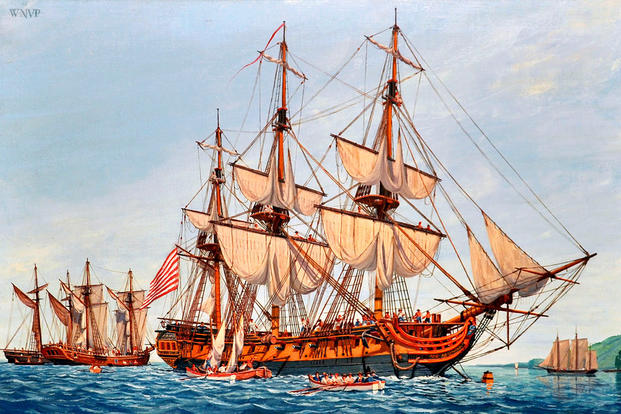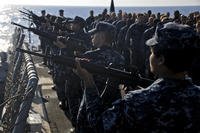On 3 October 1775, Stephen Hopkins of Rhode Island rose before the Continental Congress in Philadelphia and introduced a resolution calling for “the building and equipping of an American fleet as soon as possible.” Since the first shots were fired at Lexington the previous April, the American colonies had moved ever closer to outright revolution, provoking increasingly harsh countermeasures by the mother country. For months, the frigate HMS Rose had been patrolling Narragansett Bay, making it difficult for Rhode Islanders to conduct their customary commerce (or their customary smuggling). An infuriated Rhode Island General Assembly sought relief from the Continental Congress, enjoining Stephen Hopkins and Stephen Ward to make this rather stunning proposal.
While a small number of delegates had been advocating the establishment of a navy from the outset of hostilities, most thought it a foolish idea at best and a dangerous one at worst. In response to the Rhode Island resolution, Samuel Chase of Maryland had indignantly scoffed that it was “the maddest idea in the world.” With the Declaration of Independence nine months in the future, many of the delegates still hoped for a resolution of differences with Great Britain, and the creation of a navy was one more step away from that goal. Further, navies were rightfully viewed as expensive, and to some the Royal Navy, with its great power and offensive reach, was the face of the tyranny that had driven them to rebellion.
Reluctance prevailed, and the resolution was tabled. But two days later, word fortuitously arrived that two unarmed and unescorted brigs carrying significant stores of weapons and powder had earlier departed England bound for Quebec. This was a tempting enough target to move Congress to appoint a “Marine Committee” to explore ways to intercept these ships and divert their much needed cargoes to General George Washington, then laying siege to Boston. It did not take the committee long to come back with several proposals, one of which urged Congress to equip two armed vessels to “cruise eastward” into the Atlantic in search of ships “laden with arms and powder.” But this resolution remained in limbo until a letter arrived from General Washington explaining that, desperate for ammunition and other supplies, he had authorized—at Continental expense—three schooners to cruise off Massachusetts for the purpose of intercepting enemy supply ships. Congress acknowledged this fait accompli by passing the resolution. It was 13 October 1775—and is today celebrated as the birthday of the United States Navy.
Those founding fathers who saw to the gestation of this great nation were not wrong when they worried that navies are expensive. They were and still are. And those who were concerned that navies can be the instruments of tyranny when their great power is misused were likewise not wrong.
But as citizens of a maritime nation—then and now—we must overcome that reluctance and never lose sight of the supreme importance of a navy, properly used. Our commerce, our influence, our defense, and, ultimately, our very existence are all dependent on our willingness to make the necessary sacrifices to keep our Navy afloat and capable.
Unfortunately, it is all too easy to lose sight of this existential reality. Except for those rare moments when great fleets clash in mortal combat, much of what the Navy does is all but invisible. Maintaining an American presence on the high seas and in the far corners of this dangerous and “shrinking” world, ensuring that lines of commerce remain open for the free trade of all, preventing aggression through credible deterrence, and projecting American power when necessary to ensure our continued freedom are all vitally important and yet rarely considered by the average citizen or by their representatives in government.
Lest we forget, on this 239th Navy birthday it is altogether appropriate that we not only celebrate this “maddest idea” but that we also dedicate ourselves to its perpetuation, now and for all time.
Lieutenant Commander Cutler is the author of several Naval Institute Press books, including A Sailor’s History of the U.S. Navy and The Battle of Leyte Gulf.
Reprinted with permission from the U.S. Naval Institute. Copyright Proceedings magazine, U.S. Naval Institute.




